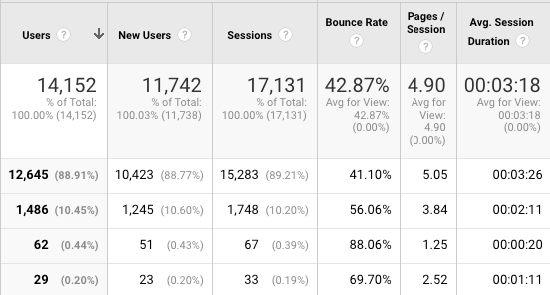- Home
- Blog
- Content Marketing What Is Content Management? Learn Everything You Need to Know in Under 10 Minutes
What Is Content Management? Learn Everything You Need to Know in Under 10 Minutes
-
 Published: Nov 1, 2022
Published: Nov 1, 2022
-
 7 min. read
7 min. read
-
 Macy Storm
Macy Storm Senior Content Creator
Senior Content Creator
- Macy is a marketing writer with over five years of experience creating content for dozens of industries including food and beverage, home services, and education. She also specializes in creating SEO and PPC content. Her work has been featured by Search Engine Journal, HubSpot, Entrepreneur, Clutch, and more. In her free time, Macy enjoys trying new crafts and reading comic books.
Did you know that 61% of people are more motivated to buy from companies that publish content?
Content marketing is a critical strategy for helping you rank in search results, earn high-quality leads, and drive revenue.
To see success with your content marketing, you need an effective content management process. But what is content management, and how can you do it well?
Keep reading to learn what it is and tips for managing your content!
What is content management?
Content management is the process of creating, publishing, promoting, and optimizing information on your website and other marketing materials. This information comes in the form of text, images, videos, and multimedia.

What is a content management system (CMS)?
A CMS is software that allows you to manage content on your website. It helps you easily post content, optimize it for SEO, and more. This software is critical for helping you post an abundance of content on your website, from product pages to blog posts.
Some popular CMS options include:

Content management process: 9 steps to managing content
Now that we defined content management, it’s time to break down all the aspects of this strategy.
Managing content involves multiple processes, including:
- Website organization
- Keyword targeting
- Branding
- Content creation
- Editing
- Publishing
- Promotion
- Tracking
- Optimizing
Let’s dive more into these processes:
1. Website organization
A key part of content management is website organization. Before you start adding content to your website, you want to ensure that you have an organized structure set up for when you add content. Whether you’re creating core pages, like service pages, or blog posts, your site needs structure.
Having an organizational structure helps you put content in the right places, so you can create a better experience when people browse content on your website.
If you want to learn how to organize your website so more of your content ranks in search results, check out the article below!
BONUS READING: How to Create an SEO-Friendly Website Structure
2. Keyword targeting
Another core component of managing content is keyword or topic generation.
Keywords are the building blocks of SEO content. From blog posts to social media updates, you’ll want to choose topics that resonate with your audience and help you earn more site traffic.
You can find the right keywords for your website by doing keyword research using a tool like KeywordsFX. Keyword research helps you identify core terms you can target in your content to drive valuable traffic to your website. These keywords help you rank in relevant results for your business.
When you’re generating keyword ideas, focus on keyword topics that contain three or more words. These long-tail keywords are more specific, so you’ll drive more qualified prospects to check out your content.
P.S. Need help generating ideas for creating content? Use our free blog post idea generator!
3. Branding
If you want to manage your content effectively, you need to have a set style for your content. You want to create a consistent experience for your audience on the platforms where they engage with your business.
You can develop your unique style by creating a style guide. A style guide helps you manage your content better by creating more consistent content. Having this structure also ensures that everything you want included in your content makes it onto the page.
4. Content creation
As expected, a core component of content management is creating content –– there’s no content to manage if you don’t create it. For your content to work effectively, you need to create and share content consistently.
Creating content often enables you to continually provide your audience with new information, so you can establish yourself as a trusted and knowledgeable authority in your field.
5. Editing
If you want to manage content effectively, you need to edit your content. Whether you create blog posts, web pages, or videos, you don’t want to put out the first copy of your content. There’s always room to improve it, so it’s critical that you edit your content.
Editing content enables you to polish up your content and ensure you’re delivering the right information to your audience.
6. Publishing
Another core component of managing content is publishing. Once you have your beautifully crafted pieces of content, you want to share them with everyone. To do that, you need to publish content.
When you publish content, consider creating templates to help make the publishing process easier. This allows you to easily upload new pages to your CMS, so you can publish more content on your website.
7. Promotion
Once you publish your content, you need to help prospects discover it. Promoting your content is a key component of your content’s success because it helps you drive qualified traffic to your website.
You can promote your content by:
- Sending it to email subscribers
- Sharing it on social media
- Asking other sites to share it
- And more
Promoting your content will help you earn valuable traffic, obtain links, and build your website’s authority in your field.
8. Tracking
You want to create content pages that enable you to drive traffic, leads, and revenue. That’s why content tracking is so important.
When you track content performance, you monitor metrics that show the impact of your content, like organic traffic, leads, conversions, and more. This data will help you understand what content performs best for your business, so you can create more of it.

9. Optimizing
The last step is optimizing content. When you create content and publish it on the web, there are always opportunities to improve it and see better results.
Optimizing content involves anything from integrating keywords to adding visuals to build engagement. Once you optimize content, you can track the performance to see how it improves traffic, leads, and revenue for your business.
Benefits of content management
Now that we defined content management and explained the components of it, you may feel like it’s a lot to do. So, why should you bother with managing your content?
If you’re creating content for your business, content management is a must. You don’t want to publish information on your website without a process in place. Otherwise, you’re just hoping for the best.
There are numerous benefits to managing your content, including:
- A better user experience: Content management enables you to create content with a consistent look and feel. Since website visitors like consistency, it’s a huge benefit to your business.
- Consistent branding: When users visit your website, you want to deliver a polished version of the information on your website. Managing your content ensures you go through the process of editing and revising content to put out cohesive, error-free information.
- Increased revenue: Content marketing is a valuable strategy for helping you increase revenue. Content management helps you put out better content more consistently and improve upon what’s already published. All these actions lead to more revenue for your business.
Meet the content management experts at WebFX
Managing content is crucial for ensuring that what you publish on your website delivers a positive user experience, captures leads, and drives revenue. If you need help managing your content, the experts at WebFX can help.
Our team of over 500 content experts can help you create and manage your content. With over 28 years of experience managing content, you can feel confident our team will provide you with engagement-worthy content that drives revenue.
To learn more about our content management services, contact us online or call us today at 888-601-5359 to speak with a strategist!
-
 Macy is a marketing writer with over five years of experience creating content for dozens of industries including food and beverage, home services, and education. She also specializes in creating SEO and PPC content. Her work has been featured by Search Engine Journal, HubSpot, Entrepreneur, Clutch, and more. In her free time, Macy enjoys trying new crafts and reading comic books.
Macy is a marketing writer with over five years of experience creating content for dozens of industries including food and beverage, home services, and education. She also specializes in creating SEO and PPC content. Her work has been featured by Search Engine Journal, HubSpot, Entrepreneur, Clutch, and more. In her free time, Macy enjoys trying new crafts and reading comic books. -

WebFX is a full-service marketing agency with 1,100+ client reviews and a 4.9-star rating on Clutch! Find out how our expert team and revenue-accelerating tech can drive results for you! Learn more
Try our free Marketing Calculator
Craft a tailored online marketing strategy! Utilize our free Internet marketing calculator for a custom plan based on your location, reach, timeframe, and budget.
Plan Your Marketing Budget
Table of Contents
- What is Content Management?
- What is a Content Management System (CMS)?
- Content Management Process: 9 Steps to Managing Content
- 1. Website Organization
- 2. Keyword Targeting
- 3. Branding
- 4. Content Creation
- 5. Editing
- 6. Publishing
- 7. Promotion
- 8. Tracking
- 9. Optimizing
- Benefits of Content Management
- Meet the Content Management Experts at WebFX

Looking for More?
Get expert ideas, industry updates, case studies, and more straight to your inbox to help you level up and get ahead.
"*" indicates required fields
Try our free Marketing Calculator
Craft a tailored online marketing strategy! Utilize our free Internet marketing calculator for a custom plan based on your location, reach, timeframe, and budget.
Plan Your Marketing Budget





